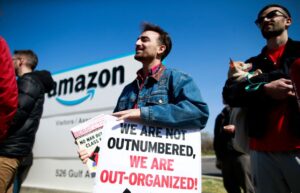The thick-necked union boss, who’s short on manners and long on tough talk and machismo, is in many ways an endangered American archetype. Amid rampant political correctness and professionalisation, they seem like anachronisms from a lost age; Sean O’Brien, president of the Teamsters, could be one of the last living specimens: his earthy ways evoke the Jimmy Hoffas and George Meanys of yore. In his speech at the Republican National Convention in the summer, O’Brien praised Donald Trump and spoke of a different political future for labour, one in which the Republicans were as attentive to workers’ concerns as Democrats had been.
When the International Brotherhood of Teamsters announced recently that their union was withholding endorsement of either of the presidential candidates, pundits and political operatives alike saw it as further proof of the very thing O’Brien was talking about: an ongoing realignment of working-class voters, away from their traditional Democratic allies and toward the Trump coalition. Indeed, the stated reason for the union’s decision was the apparent desire on the part of a large segment of the rank-and-file membership to go with the Republican candidate. The GOP is said to be transforming into a “workers’ party”, just as college-educated professionals cluster around Kamala Harris.
A culturally conservative base of labourers would, after all, make for a more natural constituency for an American Right that opposed both economic globalisation and social progressivism. Yet there are issues with this years-old narrative; particularly that the Republican Party has been painfully slow in breaking out of its ingrained predisposition for the interests of capital over labour. Their embrace of protectionism and opposition to high immigration may indirectly benefit workers on the ground, but when it comes to issues that directly touch upon working-class interests, such as pensions, labour representation, and the right-to-organise, Democrats in recent years have offered substantively more than Republicans. It’s also worth noting that regional branches of the union across the West Coast broke with national leadership to endorse Harris.
Rather than a reflection of an existing political reality, O’Brien’s speech was in effect a plea for the Right to take workers seriously at a time when the Left is accused of taking them for granted. The Teamsters’ non-endorsement could be interpreted with similar subversive intent: the downpayment on a political investment toward the prospect of a pro-worker Republican Party. However, in stark contrast, just weeks before, Trump practically patted Elon Musk on the back after the Tesla mogul bragged about firing striking workers, underscoring the former president’s own dubious record on workers’ rights both in office and as a businessman.
If “working-class party” is to be more than a slogan on the Right, it has to be matched by actual policies that materially benefit workers. But how can a party that’s been accustomed for so long to towing capital’s line be converted into a vessel for workers’ interests? For this, we may turn back to a time when labour maintained enough bipartisan engagement to extract concessions from both parties.
The Teamsters’ decision to stay neutral in 2024 is actually far more in keeping with its politically flexible tradition than expected. There was even a time when they were known as the country’s most Republican union.
Thanks, in no small part, to the animosity between then-Teamsters boss Jimmy Hoffa and the Kennedys. The Brotherhood endorsed Richard Nixon in 1960 and then again in 1972, when they were joined by Meany’s AFL-CIO in dissing the Democrats. During this period divisions over the Vietnam War, as exemplified in the Hardhat Riot of 1970, drove a wedge between workers and the increasingly radicalised Left. The latter’s countercultural values and disregard for national symbols like the flag offended the workers, who in turn defected Nixon’s “Silent Majority”.
This formula under which the GOP appealed to patriotic and traditionalist themes as a means to win over labour appears to be working once again under Trump, but alignment on cultural issues was never enough to seal a realignment. Republicans knew they had to deliver on economic gains for workers as well.
Nixon’s administration, for instance, enacted a slate of pro-labour reforms more far-reaching than at any time since the New Deal, often confounding his liberal critics in the process. These included the entrenchment of workplace protections in the Occupational Health and Safety Administration (OSHA), strengthening the financial position of millions of workers in retirement through the Employee Retirement Income Security Act, and raising the minimum wage. A case can be made that Nixon had been one of the most pro-labour presidents in the 20th century.
This is in stark contrast with Trump’s time in office in which his Labor Department opposed minimum wage hikes and union representation rights; appointed an aggressively pro-business National Labor Relations Board, advanced “right-to-work” in the case Janus v. AFSCME Council 31, repealed the “persuader rule”, which obligated firms to report anti-union advocacy, as well as the much more elementary “overtime rule” which would have allowed workers to be paid more for extra work. On O’Brien’s most urgent policy priority, the Butch Lewis Emergency Pension Relief Act, a bill that would rescue the pensions of over 2 million workers, including 400,000 Teamsters, Republicans have been solidly opposed: it had been passed by the Democratic House in 2019 but rejected by the GOP-controlled Senate. Trump’s more recent pledges to ease the tax burden on workers come as small consolation in light of this record.
And yet, despite Republicans’ lingering hostility to labour, a small cadre of genuinely populist legislators has emerged in the Senate composed of figures like Marco Rubio, Josh Hawley, and vice-presidential nominee JD Vance. The group has been supported by new heterodox policy shops dedicated to fashioning a comprehensive conservative pro-worker agenda, a modern equivalent of Nixon’s programme, which a future Republican administration could theoretically take up. But for this to happen, Republicans must acknowledge the inherent tensions that exist between their burgeoning working-class support and that segment of their base, who continue to hold outsize influence, namely the wealthy local elites in the small-business class, known as the “gentry”, who dominate the party at state and local levels.
Unlike the Democratic-leaning professional and corporate sector, the working class and small-business class generally converge in their shared cultural conservatism and patriotic ethos, yet common symbolic proclivities are not enough to wield a coalition together when there are very real differences in their respective economic aims. The gentry prefer low wages and “flexible” labour markets so as to better attract investment; but for quite understandable reasons, unions want the opposite: higher wages, benefits, and levels of protection for workers.
There is no better illustration of this divide than the epic confrontation that took place between O’Brien and Oklahoma Senator Markwayne Mullin, a non-college educated plumbing company owner and multi-millionaire. After seeming to challenge each other to a fight on the floor of a Senate hearing — something Jimmy Hoffa could have done — the two had to be stopped by Bernie Sanders of all people. The gentry and the proletariat are, evidently, not natural allies, locked as they are in a zero-sum competition.
The Republican Party must, therefore, rediscover an older mode of political engagement from before the present era of ideological polarisation, one that Nixon and the New Dealers alike would have recognised: brokerage politics. This harking back to a gentler era sees politics not as a battlefield between moral values or ideological visions, but as a bargaining table on which rival material interests can be reconciled through intricate compromise and deal-making.
To employ this ideal, a future Republican industrial policy could channel financial resources to struggling red-state and hinterland regions to the benefit of the small-business gentry. This micro-elite could then be entrusted to deploy that capital toward productive ends while having a condition of receiving such assistance could be that the same businesses must employ or negotiate with unionised labour. This effective emphasis on pro-labour “conditionality” is one that Democrats are already employing in their own industrial policy schemes. In this scenario, the gentry would be compelled to deal with labour’s demands and perhaps give up their labour market preferences in exchange for guaranteed business investment; while unions in these parts of the country would accept the continued economic leadership and sway of the gentry in exchange for tangible concessions. In other words, a zero-sum contest becomes a negotiated settlement.
The post-Reagan Right is accustomed to viewing such questions of economic distribution through ideological lenses, as a conflict of virtuous free-market principles against the perversions of socialism and collectivism. But brokerage politics would dispense with such moralism and simply assume a natural divergence of goals while working toward reasonable syntheses.
Rather than being a party exclusively of capital or labour, the GOP could instead play the role of “honest broker” between the two as it had in the days of Nixon, and going as far back as McKinley and Lincoln. It was a time when workers and businessmen alike had reason to vote for a Republican Party, who reconciled their best interests against the backdrop of an industrialising economy. Such an approach would amount to a sober, realistic path to incorporating their material interests into the Right’s agenda, closer to the transactional instincts of the union bosses of old. Under these conditions, neither Republicans nor Democrats would be able to take labour for granted again.
Disclaimer
Some of the posts we share are controversial and we do not necessarily agree with them in the whole extend. Sometimes we agree with the content or part of it but we do not agree with the narration or language. Nevertheless we find them somehow interesting, valuable and/or informative or we share them, because we strongly believe in freedom of speech, free press and journalism. We strongly encourage you to have a critical approach to all the content, do your own research and analysis to build your own opinion.
We would be glad to have your feedback.
Source: UnHerd Read the original article here: https://unherd.com/




